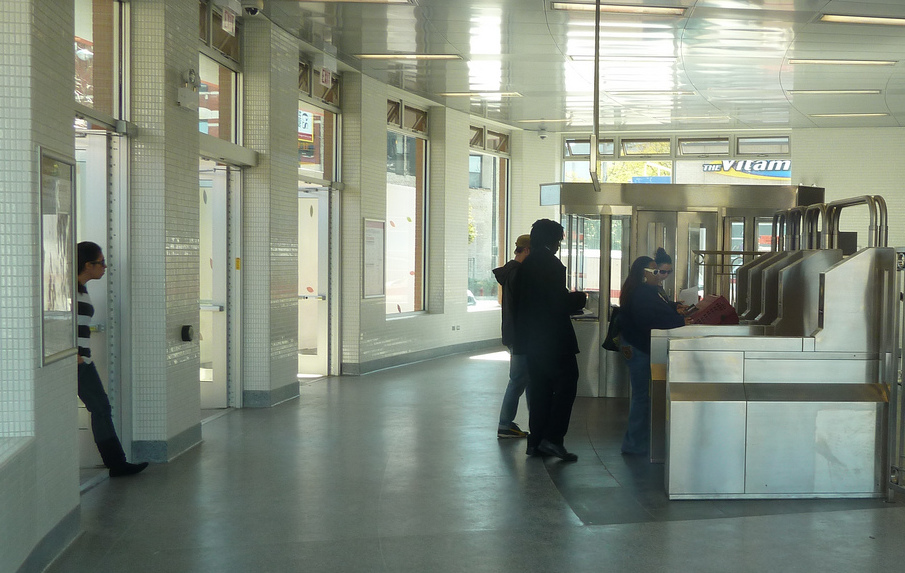[The Chicago Reader publishes a weekly transportation column written by Streetsblog Chicago editor John Greenfield. We syndicate part of the column on Streetsblog after it comes out online.]
Back around 1997, before the CTA used payment cards, wine company owner Rodney Alex, now 50, got locked up for fare evasion after jumping the turnstile at the Harrison Red Line stop, next to Jones College Prep high school.
"I had a paper transfer in my pocket, but there was a long line of students waiting to enter the station," he recalls. "I was running late for work at Carmine's Clam House and I'd been told if I was late one more time I'd be fired, so I said 'Fuck it' and jumped the turnstile."
That's when two female police officers stepped out from behind a door and handcuffed him.
"I was dressed in a frickin' waiters' tux, but they gave me no chance to explain myself," he says. They took him to the local police station, where he was charged with theft of services, a misdemeanor, and spent six hours in a cell before being released.
When he and the officers showed up for his court date, the judge dismissed the charges. "He seemed kind of annoyed," Alex says. "There's no way cops should be wasting time taking someone in for stealing $2.25. It's ridiculous."
Alex, who's black, says he believes his arrest was part of a fare evasion sting against the students of the then-largely African-American school.
"I guarantee that if this station was near New Trier there wouldn't have been two cops making sure no one jumped the turnstile," he says.
The Chicago Police Department didn't respond to questions about transit enforcement for this story. But as reported earlier this month by Streetsblog USA, with the renewed focus on the broader disproportionate criminalization of people of color and poor people, west-coast decision makers have been rethinking policies on enforcing transit fare evasion. Chicago criminal justice reform advocates say that's a conversation we should be having here as well, because being short a couple of dollars for a CTA train or bus ride shouldn't result in stiff fines or a criminal record, much less deportation.
San Francisco was ahead of the curve on the issue, passing a law in 2008 to decriminalize fare evasion, which means that you can be fined but not charged with a misdemeanor. In 2015, Washington State's King County, which includes Seattle, decriminalized fare evasion for minors.
In 2016, California decriminalized nonpayment for youth under 18. And in January, after a Portland State University study found African-American TriMet fare evaders were more likely to be penalized than white fare evaders, local prosecutors announced that they'd generally stop pursuing charges for nonpayment.
In contrast, in recent years Chicago officials have taken a hard-line approach to enforcing transit rules. A 2012 Chicago Tribune piece noted that police had made 1,548 arrests for fare evasion the previous year, and police and CTA officials told the paper their current policy was to prosecute people who jump turnstiles.
Then-CTA president Forrest Claypool (who currently heads the Chicago Public Schools) told the Tribune that cracking down on fare evasion was a strategy to prevent more serious crimes on the el system because security camera footage showed that people who picked pockets, snatched purses, and grabbed cell phones almost always entered the system illegally.
"We are arresting robbery offenders for nonrobbery crimes,'' Captain Thomas Lemmer of CPD's Public Transportation Section told the paper. "In the past, we only wrote tickets for the minor offense of stealing service from the CTA. Now we make it chargeable as a theft.''
CPD didn't provide more recent arrest numbers for fare evasion by press time, but CTA spokesman Jeff Tolman indicated that the agency still supports prosecuting nonpayment as a misdemeanor.






